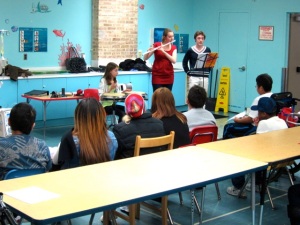Rachel Rodgers Gives Back to Others through her Program “Visiting Young Musicians”
“It’s important for me, as well as others, to see and give back to those who are not as fortunate as we are. I think we sometimes forget how lucky we are. My motto is to keep things in perspective, because there are people out there who don’t have as much as you.”
When flutist Rachel Rodgers became a girl scout, she set a course for giving back to others in the world. Her music inspired most of her community service, and she wanted it be a central part of her project for the Gold Award: the highest achievement a Girl Scout can receive. With that goal in mind, Rachel founded Visiting Young Musicians (VYM): a program run by local student musicians to provide music and joy to patients in local long-term hospitals and senior citizen facilities.
As of now, VYM visits two centers on a monthly basis: the Blythedale Children’s Hospital and the Waterview Nursing Facility in North Salem. Rachel encourages a variety of instruments, mixing up the musical friends who join her for each visit. The programs also provide a mix of genres, from classical works to jazz (Rachel being a jazz flutist herself) and even Disney songs! She shares her goals for VYM below:
I hope to achieve developing a successful program that will go on for a long time after I complete my gold award. I also hope that the musicians will realize the value of using their passion as a way to help heal others that are less fortunate than them. And, most of all, I hope to lift the spirits of the patients and make their stay better.
We asked Rachel to share more about VYM and her experiences with these concerts…
FTT: What inspired you to create VYM?
Rachel: There are two reasons why I created VYM: first, I have a strong passion for music, and I truly believe that  music is a universal language that is common to all. Second, I feel empathy for the people that are very sick and lonely, and I want to help them with my (and the other musicians’) music. Being in long-term care can be very stressful, lonely, and isolating – music can be very therapeutic during recovery.
music is a universal language that is common to all. Second, I feel empathy for the people that are very sick and lonely, and I want to help them with my (and the other musicians’) music. Being in long-term care can be very stressful, lonely, and isolating – music can be very therapeutic during recovery.
FTT: What was it like when you first started visiting these two facilities?
Rachel: I remember going to my first concert (at the children’s hospital) and when I got there, I wasn’t really sure what to do. I didn’t know how to treat the kids, or understand what it was they were going through. After a few visits (to both places) I started learning how to go about presenting and interacting with these groups: you greet them and ask them how their week was, introduce yourself to new patients or residents, and talk to them about anything they want to talk about.
FTT: What is something you’ve learned from these experiences?
Rachel: I learned that I really like to work with children, and that it may be something I want to do when I grow up, whether it be something like this program or working more closely with kids who have disabilities. But I think what I learned overall is that I really like to work with people who are less fortunate. It reminds me…how it’s SO important to reach out to others through music. It’s really great to see how our visits can help these patients feel better and more relaxed.
what I learned overall is that I really like to work with people who are less fortunate. It reminds me…how it’s SO important to reach out to others through music. It’s really great to see how our visits can help these patients feel better and more relaxed.
I also really learned patience through this project, and the need to speak gently and just sit down with others. You have to have a lot of patience for those trying to communicate with you who might have difficulty speaking, and be sure to really listen and clarify things. Patience is important in general to connect with people and kids – you have to understand what they are going through, which was a whole different level than what most of us have ever known.
FTT: What’s one piece of advice you would give to other young musicians interested in this type of work?
Rachel: You have to evaluate the circumstances before communicating with these audiences, and especially playing – I choose my songs based on what I think they’ll like. For example, I don’t want to play too much classical at the children’s hospital. I’ve learned they get a kick out of Disney music, actually! It’s not like they are completely different than we are – they are just suffering more, and you have to adjust how you play and how you talk to them.
FTT: What do you think it means to be an arts leader?
Rachel: Being an arts leader is about taking your art to a whole other level by giving back, whether it’s playing free concerts or even showing someone how your instrument works. It’s about using your art to help others recover or feel better, and this doesn’t have to just be people in hospitals – it can be anywhere there is need! Sharing your music in this way takes people to this whole other world, and inspires them to experience music in a different way.




